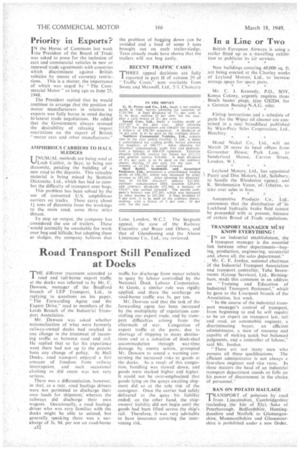Road Transport Still Penalized at Docks T HE different treatment, accorded
Page 8

If you've noticed an error in this article please click here to report it so we can fix it.
to road and rail-btirne: export traffic at the 'docks was referred to by Mr. C. DawSon, manager of the Bradford branch of LEP Transport, Ltd., in replying to questions on his paper, " The Forwarding Agent and the Export Drive,read to members of the Leeds' Branch of the Industrial Transport Association.
Mr. Dawson was asked whether nationalization of what were formerly railway-owned docks had resulted in any change in the treatment of incoming traffic as between road and rail. He replied that so far his experience went there had not up to the present been any change of policy. At Hull Docks, road transport enjoyed a fair amount of freedom from railway interruption, and such occasional clashing as did occur was 'not very serious.
There was a differentiation, however, in that-, as a rule, road haulage drivers were not permitted to discharge their own • loads for shipment, whereas the railways did discharge their own wagons: Occasionally, a road haulage driver who was very familiar with the docks might be .able to unload, but generally speaking there was a surcharge of 3s. 9d. per ton on road-borne
A32
traffic for discharge from motor vehicle to quay, by labour controlled by the National Dock Labour Corporation. At Goole, a similar rule was rigidly applied: and .there the surcharge on road-borne traffic was 5s. per ton.
Mr. Dawson said that the task of the forwarding agent has been increased by the multiplicity of regulations controlling our extort trade, and by transport difficula:es arising from the aftermath of war. Congestion of export traffic at the ports, due to shortage of shipping to many destinations and to a reduction of dock-shed accommodation through war-time damage by enemy action, prompted Mr. Dawson to sound a warning concerning the increased risks to goods at the docks. As a result of this congestion. handling was slowed down, and goods were stacked higher an-d higher. It could not he over-emphasized that goods lying on the quays awaiting shipment did s6 at the sole risk of the consignor. Once the carrier had safely delivered to the quay. his liability ended; on the other hand, the shipowners' liability did not, begin until the, goods had been lifted across the ship's rail.. Therefore, it, was very advisable to have insurance covering the intervening risk.


























